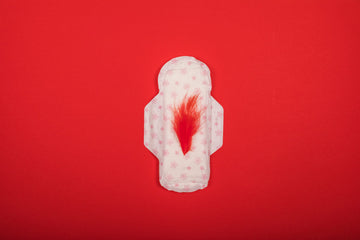Sanitary pads are an essential part of menstrual hygiene, providing comfort and safety during menstruation. However, many women experience discomfort, such as irritation, itching, or rash, when using them. These symptoms are often associated with sensitive skin, but a vital cause may be the materials used in pads, particularly those made from plastic. Most commercial pads have synthetic layers that can cause heat and moisture, causing skin concerns. This blog explores the potential connection between pad burn and the use of plastic-based sanitary pads. It also identifies the causes of this discomfort, which are at high risk, and provides safe alternatives. Understanding this problem can help create a better alternative for skin health during period.
What is Pad Burn?
Pad burning is a common type of skin irritation that occurs after the use of organic sanitary pads for several hours. It usually looks like a burning or stinging feeling around the intimate area, sometimes with redness or small rashes. This discomfort occurs when the pad causes too much friction to the skin or makes heat, sweat, and moisture. These conditions lead to skin sensitivity, especially long-lasting wear or in hot weather, leading to an unpleasant and painful period experience.
Why Do Some Pads Cause Irritation?
Friction and Rubbing
The pads that are thick, rough, or poorly designed can rub against the skin, especially during movement. This continuous friction leads to an irritable or stinging sensation, often felt after a few hours of wearing a pad. Sensitive skin can react quickly, causing redness, irritation, or even small rashes around the intimate area.
Sweating and Heat
Pads traps made with non-breathable materials, heat, and sweating, especially in warm or humid conditions. This creates a moist, warm environment that can cause skin discomfort and increase the risk of bacterial growth. The air flow can cause itching, inflammation, and irritation, especially when the pads are worn for a long time.
Chemicals and Perfumes
Some pads are fragrant or are chemicals for absorption and odor control. These added substances can trigger skin irritation during menstruation, especially for people with sensitive skin. The reactions include itching, irritation, or rash in the intimate area. Using artificial perfume pads increases the chances of discomfort, even if the pads are soft or clean.
Is Plastic in Pads the Main Reason?
Plastic is a major cause of discomfort in sanitary pads. Most pads have a plastic layer to prevent leakage during periods, but this layer blocks airflow and traps moisture. Without breath, the skin becomes warm and sweaty, especially during long wear. This trapped sweat causes friction and a burning sensation, which burns the pad. Over time, the constant heat and moisture caused by plastic content can make the skin more than itchy, with rashes, especially in warm or humid weather.
What Else Inside the Pad Can Hurt Skin?
In addition to plastic, other hidden materials in pads can damage the skin. Fragrances and deodorants are added, which freshen the pads, often made from strong chemicals that can disturb sensitive skin. Similarly, absorbent gels used for high absorption may cause itching or allergic reactions in some women. Bleached material, used to make the pads appear white, can overexpose the skin to irritants that can trigger rashes, irritation, or discomfort, especially during prolonged use or in individuals with sensitive skin.
Who Gets a Pad Burn Easily?
Pad burning is more common with sensitive skin, youth, and people living in warm, humid climates. Sensitive skin pads react quickly to heat, friction, or chemicals, causing rashes or irritation. Teens often do not change their pads enough, causing irritation. In hot weather, sweat and plastic pads stuck moisture, which increases the discomfort. By using soft, breathing, and chemical-free pads with proper hygiene, you can help prevent the pads from burning and keep the intimate area dry during the period.
What Are Safer Options Than Plastic Pads?
Choosing the right type of pads can reduce skin irritation and discomfort during the period. Natural cotton pads are soft and gentle, making them ideal for sensitive skin. Plant-based or environmentally friendly menstruation pads avoid plastic and rigid chemicals, providing both comfort and stability. Scent-free and chemical-free pads help prevent allergic reactions caused by dyes or scents. Turning on these safe options provides better airflow, reduces the risk of burning pads, and ensures a healthier and more comfortable period experience.
How Can You Prevent Pad Burn?
-
Changing pads a few hours prevents infection caused by irritation, rash and heat and moisture.
-
Gentle wash helps keep the skin healthy and reduces the risk of discomfort associated with pads.
-
Soft breathable pads help to reduce sweat, friction, and heat, making the period more comfortable for sensitive skin.
-
Scented products can irritate your skin. Unscented pads are safe and more skin-friendly during periods.
When Should You Visit a Doctor?
If burning symptoms become severe, it is important to consult a doctor. If irritation, rash, or redness worsens rather than improving, it may be a sign of a more serious problem. Inflammation, pus, or abnormal discharge may indicate an infection that requires medical treatment. If pads burning often occurs after replacing products, it may mean that the pads are not suitable for your skin. In such cases, medical advice can help prevent further disadvantages and ensure proper care.
Conclusion
Pad Burn is a common problem facing many women, but it is often ignored. These skin problems are usually caused by many common pads, especially plastic layers, artificial aroma, and harmful chemicals. The result is irritation, rash, or a burning sensation that affects comfort and health. Choosing pads made of soft, breathable, and natural materials can help avoid these problems. It is important to listen to your body and notice any discomfort signals. Turning on safe, chemical-free options can improve your period. Always prioritize skin care and hygiene. Healthy Duration Care begins by choosing the right pads, which keep you dry, comfortable, and irritation-free during your cycle.
FAQ’s:
How Can I See If My Sanitary Pad Is Causing A Skin Reaction?
After use, find signs such as itching, irritation, redness, or rash, especially in areas that come into contact with pads.
Why Does Plastic Interfere With Sanitary Pads?
Plastic traps create heat and moisture, a sweaty level environment that causes friction, discomfort, and irritation, especially during prolonged wear or in hot, humid conditions.
Can Sanitary Pads Cause Skin Irritation?
Yes, especially if they contain chemicals, aroma, or plastic layers that interfere with sensitive skin or cause an allergic reaction over time.
Is There A Safe Alternative To Plastic Sanitary Pads?
Yes, natural cotton, biodegradable, and plant-based pads are breathable, chemical-free, and much milder on sensitive skin compared to plastic-based alternatives.
What Materials In Sanitary Pads Should I Avoid To Protect My Skin?
Avoid synthetic fragrances, bleach, dyes, plastic layers, or harsh absorbent gels that can cause irritation, itching, or rash.





